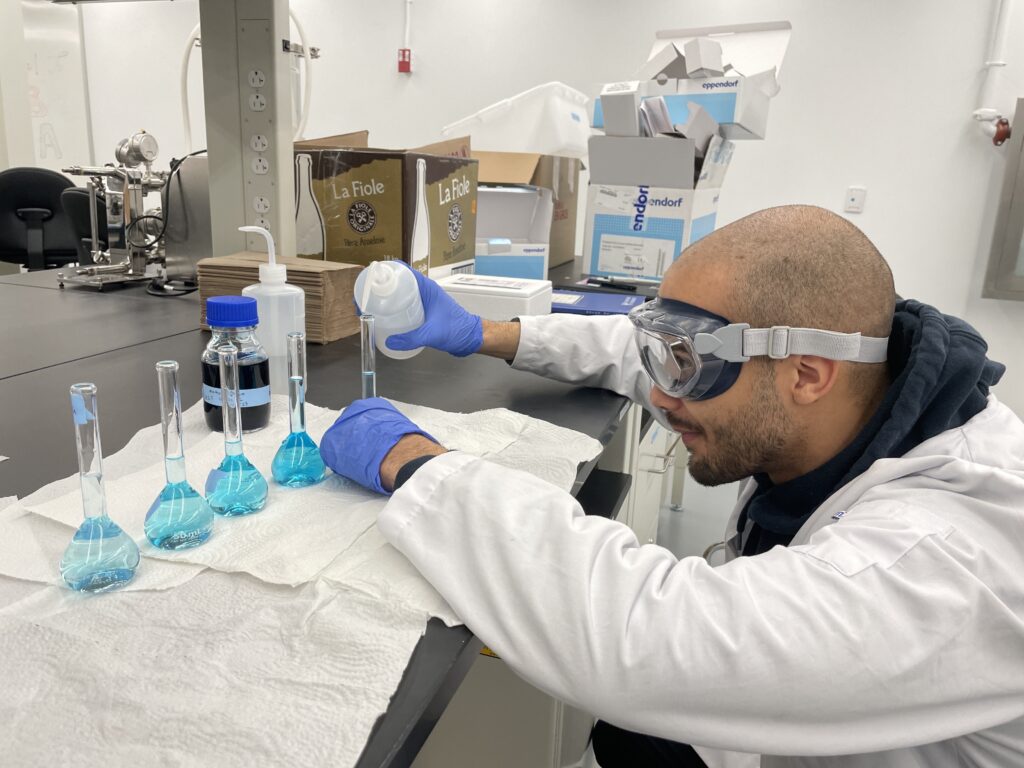Welcome to our website! Our team, founded by Dr. Stephanie Gora, researches many different topics related to Water Resources Engineering. In the page below, you can learn everything there is to know about who we are and what we do.
The underlying goal of our research group is to create a better future through water resources engineering. With many different initiatives and a world full of opportunity, the Safe and Sustainable Water Research Group aims to create a safer and more sustainable future for as many people as possible.
To learn more about our group and our initiatives, contact Stephanie at stephanie.gora@lassonde.yorku.ca
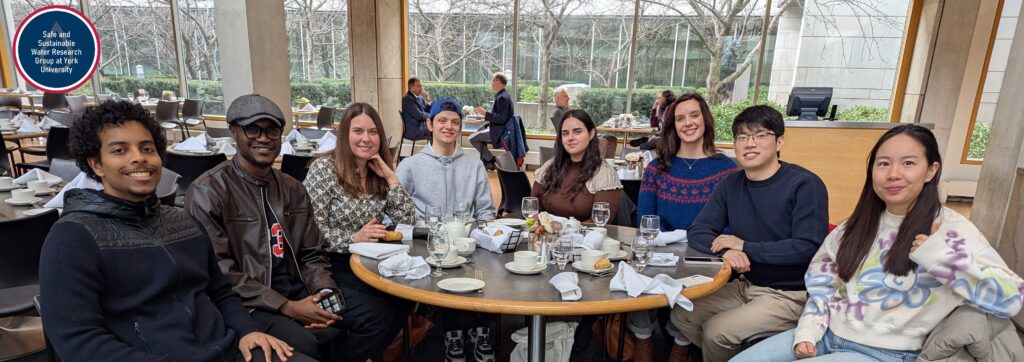

You can check out videos and recent activity from our group in the sections below.
Recent Activity
February 24, 2025 - Stephanie Gora, Adedapo Adeola, Victoria Carroll, Yiqian Wu, and Patrick Di Falco attended the 60th Central Canadian Symposium on Water Quality Research at TMU. Check out some pictures from the event here.
January 24, 2025 - Ammar Mahgoub was award the NSERC Alexander Graham Bell Graduate School Scholarship.
January 24, 2025 - Elan Chalmers, Caroline Duncan, and Stephanie Gora published their paper entitled "Development of water safety risk matrices to improve water safety in Arctic drinking water systems in Nunavut, Canada." The paper proposes a water safety planning (WSP) framework for Nunavut which has been informed by previous Arctic WSPs and existing risk scoring systems. Check out the paper here.
January 3, 2025 - Victoria Carroll has joined our team as a PhD student.
November 29, 2024 - Adedapo Adeola has joined our team as a postdoctoral fellow.
October 25, 2024 - Check out this article published by the Lassonde School of Engineering which highlights the work of the Safe and Sustainable Water Research Group on drinking water safety in the Arctic.
September 30, 2024 - Stephanie Gora and the Biofilm Task Force published their paper entitled "Control of biofilms with UV light: a critical review of methodologies, research gaps, and future directions." The paper reviewed nearly 60 articles reporting UV/biofilm experiments to better highlight advances and major gaps in research. Stephanie and the team put forward their recommendations for minimum reporting requirements in experiments and a terminology framework that could help create a more uniform understanding between studies. Check out the paper here.
September 9, 2024 - Audrey Tam was awarded the RBC Foundation Green Skills Scholarship.
July - August 2024 - Ammar Mahgoub travelled to Kuujjuaq, Quebec for a research trip where he was able to successfully collect data for his research. He looked into microbial levels in household water tanks and water treatment plant processes by collecting water samples and conducting adenosine triphosphate (ATP) analyses. Since ATP is the main carrier of energy for all living organisms, it provides a strong indication of microbial prescence in drinking water. Ammar has since began data analysis to better understand how drinking water quality may be impacted as a result of this microbial activity.
July 2024 - Yeuhyun (Kevin) Kim and Yiqian Wu assisted with the K2I Academy, allowing future researchers the opportunity to work in our lab and present their findings. Check out more about the event in our Field Notes.
June 28, 2024 - Reece Lima-Thompson successfully defended his Master of Applied Science thesis. His research involved an investigation on the impact of the scavenging capacity on costs of the UV chlorine advanced oxidation process (AOP) for drinking water treatment. To complete this, Reece applied the external calibration method to determine scavenging capacity. Reece also developed cost curves to demonstrate the economic feasibility of his research in the context of retrofitting drinking water treatment processes.
May 24, 2024 - Shapour Jafargholinejad successfully defended his Master of Applied Science thesis. His research included the optimization of microfluidic electrochemical sensors for water quality analysis. This involved the development of microfluidic electrochemical sensors through a simplified fabrication process to examine the output signal of the device. Shapour was able to verify his results by using these sensors to detect lead from treated water samples from a water treatment plant in Southern Ontario.
May 5-7, 2024 - Stephanie Gora, Reece Lima-Thompson, Audrey Tam, Yiqian Wu, Maranath Hormiz, and research colleague Michael De Santi attended the OWWA WEAO Joint Conference in Niagara Falls. Check out the our Field Notes to check out some pictures from the event.
April 29, 2024 - Maranath Hormiz and Mohammad Ibraheem have joined our team as candidates for a MASc degree.
April 13-20, 2024 - Stephanie Gora, Caroline Duncan, and Audrey Tam spent the week in Cambridge Bay, Nunavut promoting drinking water safety. Caroline will be staying in the community for the next several week to continue this work. Check out some moments she was able to capture in our Field Notes. You can also check out Steph's post about it here along with Polar Knowledge's post as well.
April 9, 2024 - Audrey Tam and Patrick Di Falco presented their posters at the 59th Central Canadian Symposium on Water Quality Research at Western University. Check out some pictures from the event in our Field Notes.
March 21, 2024 - Reece Lima-Thompson presented his research at the OWWA Treatment Seminar in Mississauga, Ontario. Check out his post about it here.
February 22, 2024 - Get to know more about Ammar Mahgoub by checking out his interview with Lassonde here.
January 19, 2024 - Sara Moghaddam-Ghadimi successfully defended her Master of Applied Science thesis. Her research involved the application of engineering design principles to investigate water safety issues within distribution systems. Sara was able to identify potential solutions which were backed up by literature review, stakeholder consultation, and software analysis.
January 16, 2024 - Winners of the 2023 Lassonde Research Photo Contest were announced and our very own Audrey Tam was announced as the winner for "Best EDI Integration & Impact." Take a look at Audrey's photo here.
An Update on Caroline's Work in Cambridge Bay (June 2024)
In June 2024, members of the Safe and Sustainable Water Research Team joined Caroline Duncan (Civil Engineering, Lassonde) for the final week of her extended research visit to Cambridge Bay, Nunavut. This complex, community-centered research project pairs water system mapping and extensive water sampling with focus groups and targeted individual interviews with water systems stakeholders (operators, regulators, system users, etc.). The end goal is to develop a participatory system dynamics model that incorporates all of these quantitative and qualitative inputs and can be used by stakeholders to understand and positively influence water safety in Cambridge Bay.
Caroline and Stephanie also had the opportunity to present the key findings from our first research paper about water safety in Nunavut to the Cambridge Bay Municipal Council and other community stakeholders. The goal of this meeting was to ensure that the information and findings were accurate and useful to the community before the work is submitted for peer review. The presentation was also attended by board members of Polar Knowledge Canada and the US Arctic Research Commission.
Caroline’s research has been conducted in parallel with a student outreach and training program, the Nunavut Youth Water Operator Training Program, funded by the Nunavut Association of Municipalities (NAM) and designed and implemented by members of the Safe and Sustainable Water Research Group at York University. This program represents a concrete contribution to capacity building among youth in Cambridge Bay and has been a powerful way for our team to give back to the community that has so warmly welcomed and supported Caroline and her research.
This initial offering of the program consisted of two weeks of training provided by York University faculty and graduate students to three high school students in Cambridge Bay. The course covered topics including water safety and the multibarrier treatment approach, applied math and chemistry, WHMIS and laboratory safety, Arctic hydrology, data collection and analysis, and water sampling and testing. The course also included multiple visits to the Cambridge Bay water treatment plant, water sampling from different parts of the water system (source water, treatment plant, cisterns, taps), and informal interactions with water operators and engineers
Two of the students who participated in the program have been hired as research assistants in the Safe and Sustainable Research Group for the summer of 2024. They will be based in Cambridge Bay NU and will be taking water samples in support of Caroline’s research project. All three students will travel to the NAM conference in Iqaluit in November to present their work to mayors and senior administrative officers from across the territory. The Nunavut Youth Water Operator Training Program has also been nominated for an award through Water Canada in the Downstream Category (https://watersummit.ca/home/water-canada-awards/2024-finalists/).
The final highlight was the happy intersection of our trip with a community visit by engineers and operators from Associated Engineering and the Government of Nunavut, who were eager to share their expertise with the students and with us.
Our team is so proud of the work that Caroline has done in Cambridge Bay and we are looking forward to supporting her as she wraps up her PhD research over the next year. Her tireless efforts to build meaningful relationships with water stakeholders in Nunavut has enabled and strengthened our larger Arctic water research program and her work is already making positive impacts on water safety in the North. Our team looks forward to implementing new collaborative research projects in Nunavut related to water distribution and source water characterization and to continue to work with NAM and others to scale up youth water programming in the territory.
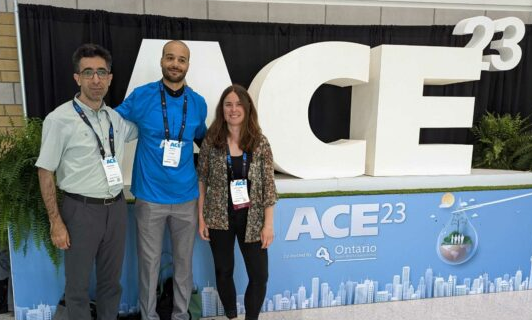
About Dr. Gora
Take a minute to learn some more about the founder of the Safe and Sustainable Water Research Group
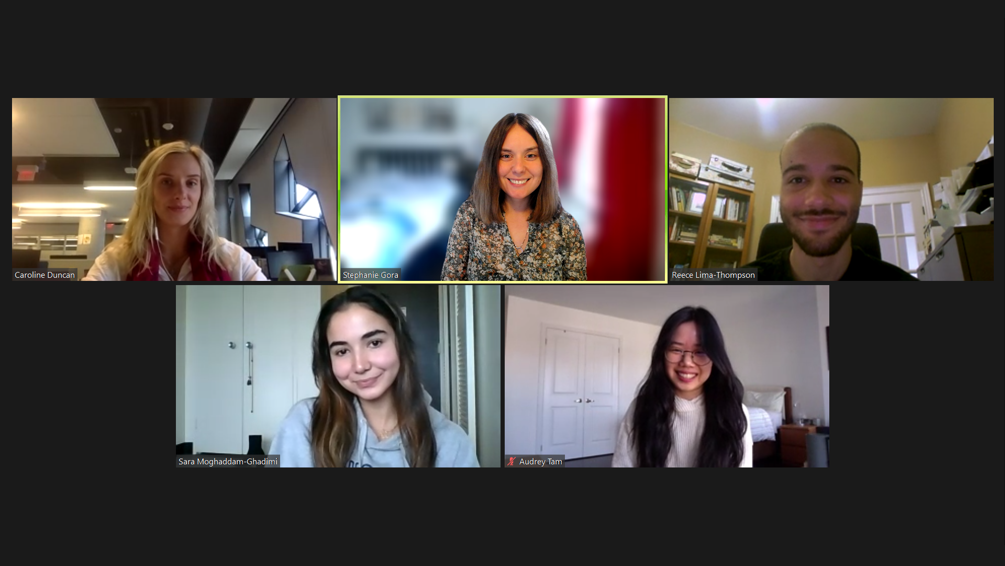
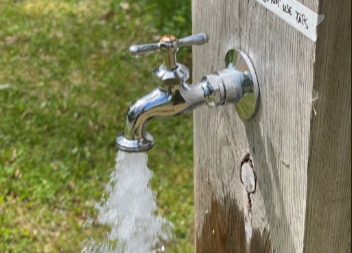
Our Work
In addition to being able to view our published work below, you can also learn more about the outreach of our team's research as well
